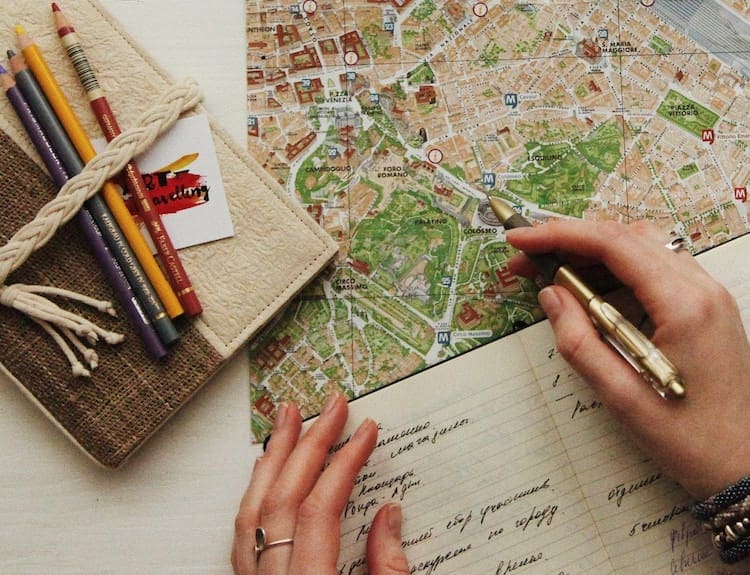The key to writing while traveling is good preparation. We detail everything you need before you jettison off to destinations untold.
Dreams and visions of writing while traveling through Italy or road tripping down the coast of California may be dancing within your mind. Taking yourself out of your usual surroundings can be deeply inspirational, illuminating the mysteries and beauty of new places, sounds, and cultures. To really prep for a trip where you’ll be writing as much as you’ll be indulging in the tourist lifestyle, you’ll want to prep ahead.
The poet, through time, has managed to capture the essence of not only him or herself, but of humanity. It may be filtered through a personal lens, but poems are small momentos, photographs of time or place, or realization. And any place or situation can leave an indelible mark on the poet and the poet’s work.
1. Be present.
If you want your travel to profoundly impact your poetry, you’ll want to remain completely and totally aware of your surroundings. Of course, this is for safety purposes, but it’s also so you can let the place you’re in settle into your consciousness. Keep a map handy, but try to stay off of your phone. The goal is to unite with the place, to not always have one foot in the digital world.
2. Keep a camera or recorder on hand.
You will want to bring a recording device with you, as photographs only go so far. A smartphone works well, although an audio recorder would be magical, too. You’ll want to record the sounds around you: the ocean, the park, the hum of street chatter, the birds on the peer, the conversations within a gelato shop.
This audio captures the essence of a space, the timbre of its people, the ambiance of nature. You may choose to listen back to this later to write a set of poems, or to immerse you in your memories while you write and edit upon your return home.
3. Keep a journal.
For any trip, you’ll want to keep a journal. Yes, this journal might include poetry, but it should serve as a dedicated place for your thoughts and impressions of the place you’re exploring. You may choose to have a different journal for this, or you can set apart a section of your daily journal to chronicle your adventures. The reason for this is that a poet’s work is not only writing poetry, but to capture the world around them. You must do that, before you can distill your experience of a place into something beautiful.
Travel Journal Prompts for Poets:
- What are the colors around you?
- What does this place evoke? Is there a sadness in the air? Is there a sense of hope?
- How does its energy differ from where you live?
- Is there something about it you want to never leave?
- What might the trees or water here know?
- What are the secrets in the streets?
- What are you sensing that might not be clear to others?
4. Travel with a talisman.
Travel with something that invokes your writing spirit. This should be unique to yourself — a quartz, a coin, a ring, something that reminds you of who you are as a writer. Holding onto this as you travel reminds you that you are there as a writer, that you are inspired. Be sure to “program” the object ahead of time — hold it in your hand and designate its duty.
6. Dress to write poetry.
This may seem a bit abstract, okay? Most tourists dress comfortably, and we encourage that as well, so take this tip as an additional consideration when you’re packing and dressing away from home. If you’re spending the morning at a cafe writing, or if you’re heading to a park to simply people watch and perhaps write, dress in a way that encourages your creativity. Perhaps a color stirs the muse in you. A cerulean blue jumper may help you feel more yourself, or maybe white linen conjures that sense of freedom and sun and warmth that you want to imbue in your work. Wear it.
7. Create an itinerary with room for spontaneity.
Very often, poets are traveling with friends or family members who block out each and every hour. (Or maybe you’re the planner in your group– we don’t judge.) This can result in us never getting a spare moment — to write, to wander, to get lost, to be silent, explore, to check in with our feelings.
The poet, usually a spongey empath, may need downtime (I do!) so it’s important to carve out some space for yourself. Perhaps you choose the early morning, or you break away from the group during the post-lunch nap? Make sure you give yourself the flexibility and permission you need to be generative.
8. Read.
Bring another writer’s works with you. We especially recommend a poet who writes about or was born in the place you’re visiting. If you’re in another country, try to secure their translated works so you can experience the poetry through the eyes of someone who knows it and speaks it well. When I read Marguerite Duras in France and Italy, for example, it changed her work for me. I could see it exist off the page in some way.













